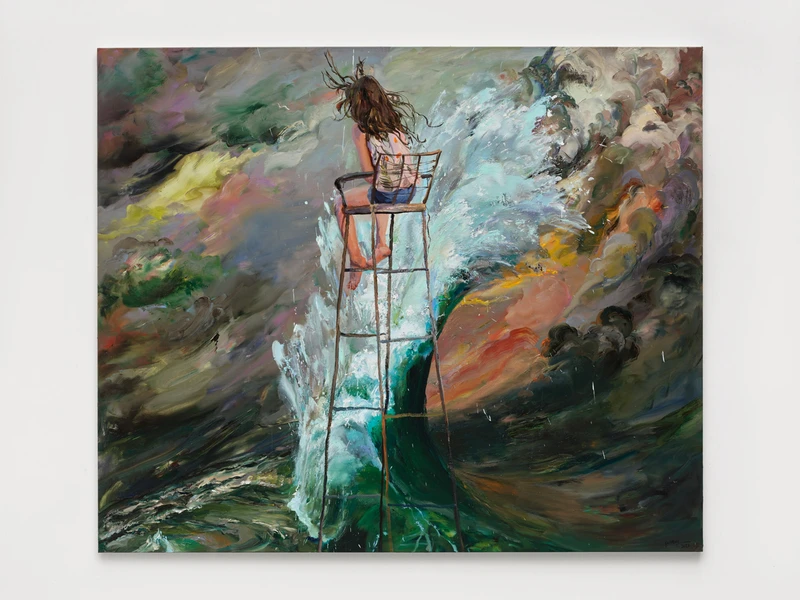Yu Hong: Islands of the Mind
27 Sep-14 Dec 2024


For her first solo exhibition in London, Yu Hong presents a series of large-scale new acrylic-on-canvas paintings. Based between Beijing and New York, the artist, who has been described as one of the most important voices of her generation, unveils a selection of poignant and poetic paintings that each explore a distinctive state of mind or consciousness. Inspired by Arnold Böcklin’s Island of the Dead (1880-1901), this suite of paintings expands on the body of work unveiled in Yu Hong’s solo exhibition at the SCAD Museum of Art, Savannah in 2023, and follows her first major exhibition in Europe, where she transformed the Chiesetta della Misericordia in Venice through a series of new works, organised by The Asian Art Initiative of the Guggenheim Museum, New York.
For this presentation, Yu Hong focuses on the concept of psychological landscapes, with each painting embodying an emotion or experience that unites us all: be it love, expectation, survival, oblivion or repose. In each of these works we witness the complexity of these experiences; the light with the dark. In Island of Love (2023), we discover a tender, seemingly blissful scene with two entwined figures intimately cocooned within a pink blossom tree, the lovers’ outstretched arms uniting above them in a symbol of hope. Yet on a towering flowering foundation they are alone in a vast expanse of water. The foreboding sea, with its waves pounding against the rock, becomes one with the sky, painted in what could be perceived as a heavenly, golden glow or a tempestuous volatility. In Island of Life (2024) there is a similar evocative glow, with two reclining figures – perhaps Adam and Eve, with the lush apple tree and exotic birds beside them – only visible by their legs. The painting, depicting equally solitary figures with just the sea beneath them, can be seen as a metaphor for paradise and the contradictions of life: the balance between joy and suffering, strength and weakness, temptation and control, love and loss.
Like many artists, Yu Hong gravitates toward the ocean as a recurring motif, symbolising depth, beauty, constant change, and the undercurrent layers of emotion. In Island of Expectation (2024) we see a young female figure, with her back to the viewer, sitting atop a high, laddered chair gazing out at a dramatic, turbulent sea, captured at the moment of the eruption of a powerful wave. In many of Yu Hong’s paintings, there is a sense that the character is on the edge, suspended in time, and often confronted with an extreme weather pattern, from rising sea levels to blazing tornados. In Island of Repose (2024) a lone female figure shelters her face with her arms as the sea prepares to wash over her; in Metropolis Island (2024), three adolescent girls converse on spiral staircases which surround a broken chimney while the world combusts beneath them; and in Island of Oblivion (2024) a group of contorted figures find refuge behind a rock, their bodies merging with their form of protection.
The exhibition also features Night Walk (2023), a monumental three-panel work referencing Pieter Bruegel the Elder’s The Blind Leading the Blind (1568). In this biblical, otherworldly painting, a line of adults bearing sticks with closed eyes cross a burning volcanic landscape, one of them riding a tricycle holding a group of wide-eyed children, with a screaming, chained monkey trailing behind. The procession, following two other (also blind) figures leading the way, impels the viewer to understand the individuals also as an entity – as a group endeavour with a shared destiny.
One of the final and most dramatic works in the exhibition is Island of Survival (2024), depicting a frenzy of figures wrestling, twisted and writhing atop a platform set against a rendering of Gustave Courbet’s The Sea (c.1865). There is a sense of instability and unpredictability, heightened by the dark, tumultuous sea, but a brief break in the sky serves as a nod to the possibility of resolution. With Yu Hong’s personal experiences living between East and West, witnessing the considerable changes that have taken place in contemporary life during this time, this new body of work reflects on our shifting, precarious state and provides a cathartic opportunity to both immerse ourselves in the deepest, darkest waters, and return to witness an opening in the clouds.